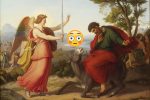Around the year 170 B.C.E., just a ton of dramatic $#%& was happening in the Middle East. Quite like now, but without Twitter. The land of Israel—Judea—was annexed and had become part of the Syrian-Greek Seleucid empire, ruled by King Antiochus, who was a total King Joffrey Baratheon. Just a delight. Antiochus, not to be confused with Rihanna’s latest album “Anti,” was having some personal problems with the Roman empire and was bitter about it, which made him even more of a jerk.
While some Jews in the land of Israel were open to a more Hellenistic life, Antiochus decided he was going to force the issue by making the Jews give up all things Jewish. The alternative was death, and not the quick kind everyone hopes for. This persecution resulted in stories of gruesome Jewish martyrdom, including the iconic story of Hannah and her seven sons. (Spoiler alert: They were murdered one by one after refusing to give up Judaism.) Antiochus also trashed the Holy Temple on the Temple Mount, booted out the high priest and popped a few idols up in there.
It was around this time that the Jewish Rebel Alliance was formed. Led by Judah the Maccabee—the word “Maccabee” comes from the Hebrew phrase Mi Kamocha Ba’eilim HaShem (“Who is like You, O God”)—this rebellion fought the rule of Antiochus and forced polytheism. (Some Hellenist-sympathizing Jews were also killed by the Maccabees, but that kind of spoils the whole vibe of the holiday so, ahem, never mind.)
Antiochus kept sending waves of troops to put down the Maccabees, but kept getting their asses handed to them by Judah and Co. The Macca-beat down was so emphatic that the Maccabees were able to liberate Jerusalem and the Temple from the forces of Antiochus in 164 B.C.E. They could barely find enough pure olive oil to light the ceremonial menorah in the rededicated Temple, but they found one tinyyyy lil’ Tupperware full—enough for one day of light. Miraculously, this oil was an overachiever and lit the lamp for eight days.
Judah “The Hebrew Hammer” Maccabee was hip to the fact that wars don’t end cleanly, or quickly. While Jerusalem had been liberated, the rest of Judea was still at risk or under enemy control. It took years and years of fighting before the Maccabees forced the Seleucids to retreat from the land of Israel. By this time, Antiochus had kicked it and his successor agreed to the Jews’ demand for independence. In the year 142 B.C.E., after hundreds of years of subjugation under Persian or Greek rule, the Jews were again masters of their own fate with the rise of the Hasmonean dynasty. BOOYA!
The Maccabees ushered in a period of Jewish independence in Judea.
During Hanukkah, Jews also recount the story of Judith, a woman living in a city under siege in Judea. Her story became part of the Hanukkah narrative due to the through-line of “Jews with swords.” To save the people of her city from certain death from starvation, Judith pulled a “Mission Impossible” mission. She went to meet Holofernes, the commander of the besieging army, and told him she would spy on the Judeans for him. He began to trust her, and especially liked the local farm-to-table cheese she brought him, which was his mistake, because TL:DR he ate the cheese, he got thirsty, she got him drunk and when he passed out she cut off his head with his own sword, and dunked it straight into her maid’s basket. The story goes that the sight of Holofernes’ headless body freaked out his army so much they paced out. Who can blame them? This iconic AF beheading is the subject of many works of art, and should definitely be optioned for a smashing HBO adaptation.
The story of Judith is, funnily enough, one reason many Jewish communities serve cheese or dairy dishes during Hanukkah. (YES! That’s right! Before the potato made its dramatic entry into Jewish food, latkes were made of CHEESE.) In Italy, for example, ricotta latkes are still a thing. So, put that in your “applesauce vs. sour cream” online poll and smoke it.







